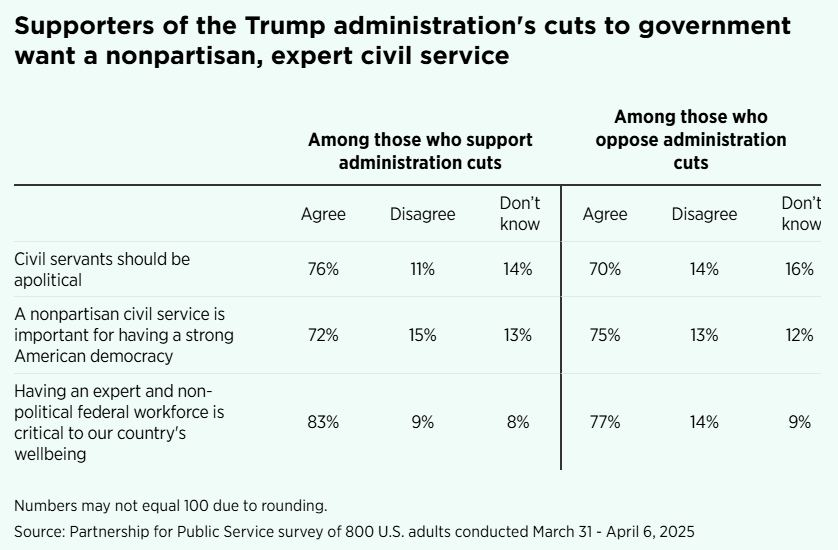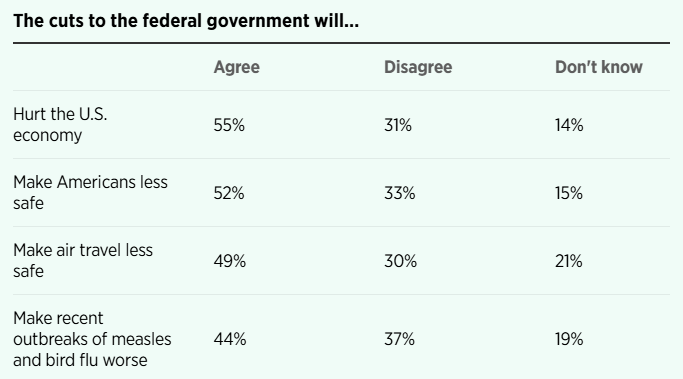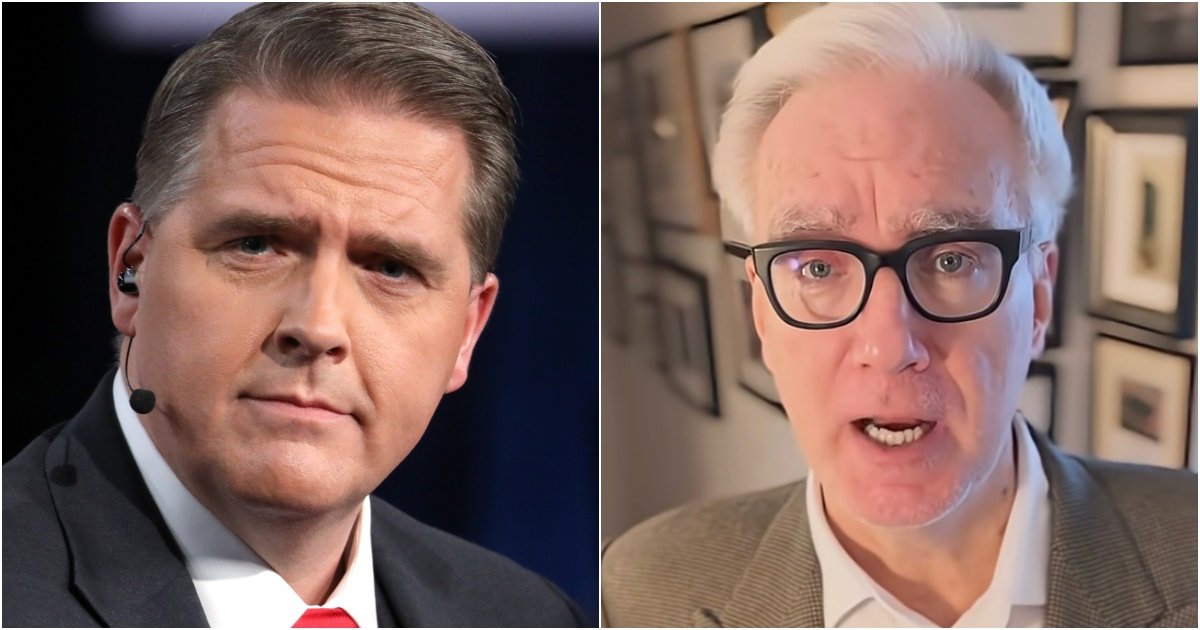Politics
Supporters of Trump’s agency cuts still favor nonpartisan federal workforce, survey shows

The Trump administration has taken a multi-pronged approach to overhauling the civil service — attempting to open the doors more political appointees, while also making it easier to remove career federal employees from their jobs. But those workforce changes don’t appear to resonate positively with many Americans, including those who are supportive of the administration’s federal workforce cuts more broadly.
In a recent survey, the Partnership for Public Service found that among individuals who approve of the Trump administration’s cuts to federal agencies, there is little support for a politicized federal workforce. The survey results showed that 83% of supporters of the Trump administration’s cuts agreed that having an expert and non-political federal workforce was “critical” to the country’s wellbeing.
Paul Hitlin, the Partnership’s senior research manager, said those results indicate that any support for agency cuts and employee layoffs instead come from a different desire.
“It really is about cutting spending, and certainly waste and fraud,” Hitlin said Tuesday during a virtual event hosted by the Partnership. “It’s not about putting in a civil service that is political in nature.”
Supporters of the administration’s cuts were also more opposed to the idea of a politicized federal workforce than those who were against the cuts. For instance, 76% of supporters of the administration’s cuts said civil servants should be “apolitical,” while 70% of those opposed to the cuts answered the same way.
Results from 2025 survey on the public’s perception of the Trump administration’s federal workforce cuts. (Source: Partnership for Public Service)
Still, the Trump administration has been pressing forward with significant changes in the structure of the civil service. Most recently, President Donald Trump signed an executive order establishing a new class of federal employment, called Schedule G. The classification is reserved for political appointments who focus specifically on policy-making or policy-advocating work.
Earlier this year, Trump also revived his previous Schedule F executive order — now called Schedule Policy/Career — which aims to reclassify career federal employees to strip their civil service protections and make them easier for agencies to fire.
The White House has said its efforts will make the federal workforce more accountable and give agencies more flexibility in deciding who to retain or remove from their jobs. But many organizations, including the Partnership, have spoken out against the administration’s policies and warned they will lead to a politicization of the non-partisan federal workforce.
“You do not see a lot of support for that, even among people who are in favor of the administration’s cuts,” Hitlin said.
The Partnership’s survey also showed positive public perceptions of the federal workforce, despite growing rhetoric from the Trump administration criticizing the career civil service and promising to “drain the swamp.” In the results, 51% of respondents said they opposed the recent federal workforce layoffs, while 37% supported the layoffs and 12% were unsure.
“We also found in some of our focus groups that there was a lot of uncertainty, even among people who support the cuts,” Hitlin said. “And there’s a large amount of people who said that they thought there might be some hiccups and problems, but they still thought [the cuts were] worth it overall.”
Over the last several years, the Partnership has also regularly published polling results that show public trust in government continues to decline. In 2024, 23% of Americans said they trusted the federal government — an 11% decrease since 2022. But the Partnership’s research has also shown that the public trusts career civil servants themselves more than the federal government as a whole.
“By focusing on the elements of the government that may not receive as much attention as Congress —such as civil servants and the missions of federal agencies — an opportunity exists to increase the public’s trust,” the Partnership has said.
More recently, supporters of the Trump administration’s federal workforce overhauls remain in the minority, according to the Partnership’s latest survey results. Over 50% of survey respondents said they believed the cuts would hurt the U.S. economy, make Americans less safe and make their communities worse.
 Results from 2025 survey on the public’s perception of the Trump administration’s federal workforce cuts. (Source: Partnership for Public Service)
Results from 2025 survey on the public’s perception of the Trump administration’s federal workforce cuts. (Source: Partnership for Public Service)
When asked to select their top three concerns about the cuts, most survey respondents said they were worried about the government’s ability to deliver benefits like Social Security, Medicare and Medicaid.
“Other things like disease research and prevention, food safety and veterans’ health care and benefits — a lot of people selected those as well,” Hitlin said. “But by far, delivery of benefits was the top concern.”
In its latest survey results, the Partnership also found that roughly one-third of respondents said they or someone they know had been personally impacted by the administration’s cuts to agencies.
“This isn’t just an ‘inside the beltway’ story,” Hitlin said. “Large numbers of people are making connections about how these cuts are affecting things around them and seeing that. And over time, that number may grow.”
The post Supporters of Trump’s agency cuts still favor nonpartisan federal workforce, survey shows first appeared on Federal News Network.
Politics
Black Lives Matter Activist in Boston Pleads Guilty to Federal Fraud Charges – Scammed Donors to Fund Her Lifestyle

Screencap of YouTube video.
A Black Lives Matter activist in Boston named Monica Cannon-Grant pleaded guilty to federal charges this week, admitting that she scammed donors and used their money to fund her own lavish lifestyle.
Cannon-Grant was previously held up as an admired figure. The city of Boston named her the Bostonian of the year at one point for her ‘social justice activism’ and she was even recognized by the Boston Celtics basketball team for her efforts.
She is now facing a minimum of two years in prison.
The New York Post reports:
BLM-linked activist admits conning donors to fund her lavish lifestyle
A once-celebrated Boston social activist has pleaded guilty to defrauding donors — including Black Lives Matter — out of thousands of dollars that she used as a personal piggy bank.
Monica Cannon-Grant, 44, pleaded guilty Monday to 18 counts of fraud-related crimes that she committed with her late husband while operating their Violence in Boston (VIB) activists group, according to the US Attorney’s Office in Massachusetts.
The activist scammed money — including $3,000 from a BLM group — while claiming it was to help feed children and run protests like one in 2020 over the murder of George Floyd and police violence.
Cannon-Grant also conned her way into getting $100,000 in federal pandemic-related unemployment benefits — which she used to pay off her personal auto loan and car insurance policy.
But she has now confessed to transferring funds to personal bank accounts to pay for rent, shopping sprees, delivery meals, visits to a nail salon — and even a summer vacation to Maryland.
Just amazing.
Monica Cannon-Grant stole from donors, scammed the government, and lived it up while preaching about oppression. BLM grift is the only nonprofit where fraud is part of the mission statement. https://t.co/ir3q9lqYrh
— Matthew Newgarden (@a_newgarden) September 23, 2025
BREAKING: BLM activist Monica Cannon-Grant pleads guilty to 27 fraud charges, misusing over $1M from Violence in Boston for personal gain. Echoes Sir Maejor Page’s $450K scam conviction. A wake-up call for nonprofit accountability. pic.twitter.com/N9vvD369gB
— (@pr0ud_americans) September 14, 2025
Here’s a local video report:
She should pay back every penny.
The post Black Lives Matter Activist in Boston Pleads Guilty to Federal Fraud Charges – Scammed Donors to Fund Her Lifestyle appeared first on The Gateway Pundit.
Politics
Keith Olbermann Backpedals Furiously With Apology for Threatening CNN’s Scott Jennings – Jennings Responds (VIDEO)

As the Gateway Pundit reported yesterday, former MSNBC host and generally unhinged leftist Keith Olbermann, appeared to threaten CNN’s conservative pundit Scott Jennings on Twitter saying, ‘You’re next motherf**ker.’
Well, Olbermann may have gotten a phone call or a visit from the FBI because today he walked back those comments with a full-throated apology.
RedState has an update:
To quickly recap, Scott Jennings, a Salem Media Network radio host and conservative CNN political commentator, reacted to breaking news on Monday that Kimmel had been reinstated by tweeting, “So basically his employer suspended him for being an insensitive pr**k, and we don’t live in an authoritarian regime? Got it.”
This enraged Olbermann, who proceeded to tweet what many, including Jennings, perceived to be a threat. “You’re next, motherf**ker. But keep mugging to the camera.” Jennings tagged Patel and included a screengrab of the tweets in response.
Though the FBI hasn’t commented as to whether an investigation was launched, Olbermann ostensibly appears to have thought twice about what he tweeted and deleted, apologizing profusely in tweets posted on Tuesday and claiming what he wrote was “misinterpreted”:
See Olbermann’s tweet below:
I apologize without reservation to @ScottJenningsKY
Yesterday I wrote and immediately deleted 2 responses to him about Kimmel because they could be misinterpreted as a threat to anything besides his career. I immediately replaced them with ones specifying what I actually meant. pic.twitter.com/SPWLb73nEk
— Keith Olbermann (@KeithOlbermann) September 23, 2025
I oppose and condemn political violence, and the threat of it. All times are the wrong time to leave even an inadvertent impression of it – but this time is especially wrong
I should've acknowledged the deletion and apologized yesterday. I'm sorry I delayed.
— Keith Olbermann (@KeithOlbermann) September 23, 2025
Scott Jennings, always a class act, offered this hilarious response:
SCOTT JENNINGS: “Marking myself SAFE from that NUT, Keith Olbermann!” pic.twitter.com/EYZX6vm5Oh
— Dustin Grage (@GrageDustin) September 23, 2025
Keith Olbermann really needs help. The guy is just so out of control.
The post Keith Olbermann Backpedals Furiously With Apology for Threatening CNN’s Scott Jennings – Jennings Responds (VIDEO) appeared first on The Gateway Pundit.
Politics
Where is Lance Twiggs? Kirk Assassin’s Transgender Lover Has Vanished

 Charlie Kirk assassin Tyler Robinson and roommate Lance Twiggs
Charlie Kirk assassin Tyler Robinson and roommate Lance Twiggs
Charlie Kirk assassin Tyler Robinson lived with his transgender partner – a male-to-female trans named Lance “Luna” Twiggs.
The FBI used Robinson’s texts with his transgender partner to solidify that Robinson was the assassin. Lance Twiggs has not been charged with any crime; however, federal authorities are still investigating.
Last week, Utah authorities released the text exchange between Tyler Robinson and his transgender lover, Lance Twiggs, sent shortly after Kirk’s assassination.
Utah County District Attorney Jeff Gray announced seven charges against Charlie Kirk assassin Tyler Robinson. They will also be seeking the death penalty.
Robinson was charged with:
– Count 1: Aggravated murder (capital offense)
– Count 2: Felony reckless discharge of a firearm causing bodily injury
– Count 3: Felony obstruction of justice for hiding the firearm
– Count 4: Felony obstruction of justice for discarding the clothing he wore during the shooting
– Count 5: Witness tampering for asking roommate to delete incriminating messages
– Count 6: Witness temperating for demanding trans roommate stay silent, and not speak to police
– Count 7: Commission of a violent offense in the presence of a child
Jeff Gray released the chilling texts between Tyler Robinson and his “love” Lance Twiggs.
Read the text exchange here:
 Tyler Robinson texts with transgender lover Lance Twiggs / 1
Tyler Robinson texts with transgender lover Lance Twiggs / 1
 Kirk assassin Tyler Robinson texts with transgender lover Lance Twiggs / 2
Kirk assassin Tyler Robinson texts with transgender lover Lance Twiggs / 2
Lance Twiggs was reportedly cooperating with the FBI, however, according to the Daily Mail he has seemingly vanished.
“If [Lance Twiggs] ever comes back, it will be in a body bag,” a neighbor said to the Daily Mail. “That’s not a threat – I’m just saying that there are so many people who want a piece of him he’d be mad to show his face in public again. This was a generational event.”
The Daily Mail reported:
The Trans boyfriend of Charlie Kirk’s alleged assassin has fled their former lovenest – and locals tell the Daily Mail they never want to see him again.
Lance Twiggs, 22, was led away for questioning when police swooped on the smart three-bed condo he shared with accused gunman Tyler Robinson, 22.
Shaken neighbors say the part time plumber has not been back to the $320,000 property in St. George, Utah – one declaring: ‘Good riddance. I never want to see either of them again.’
His beaten-up Infinity compact is still parked in his space with his work gear tossed across the back seat and a sandwich wrapper and a drink on the front passenger seat.
Upstairs lights have been left on for more than a week and notes and Amazon packages are piling up outside the home owned by Twiggs’s devout Mormon family.
The post Where is Lance Twiggs? Kirk Assassin’s Transgender Lover Has Vanished appeared first on The Gateway Pundit.
-

 Entertainment6 months ago
Entertainment6 months agoNew Kid and Family Movies in 2025: Calendar of Release Dates (Updating)
-

 Entertainment3 months ago
Entertainment3 months agoBrooklyn Mirage Has Been Quietly Co-Managed by Hedge Fund Manager Axar Capital Amid Reopening Drama
-
Tech6 months ago
The best sexting apps in 2025
-

 Entertainment5 months ago
Entertainment5 months agoKid and Family TV Shows in 2025: New Series & Season Premiere Dates (Updating)
-

 Tech7 months ago
Tech7 months agoEvery potential TikTok buyer we know about
-
Tech7 months ago
iOS 18.4 developer beta released — heres what you can expect
-

 Tech7 months ago
Tech7 months agoAre You an RSSMasher?
-

 Politics7 months ago
Politics7 months agoDOGE-ing toward the best Department of Defense ever



